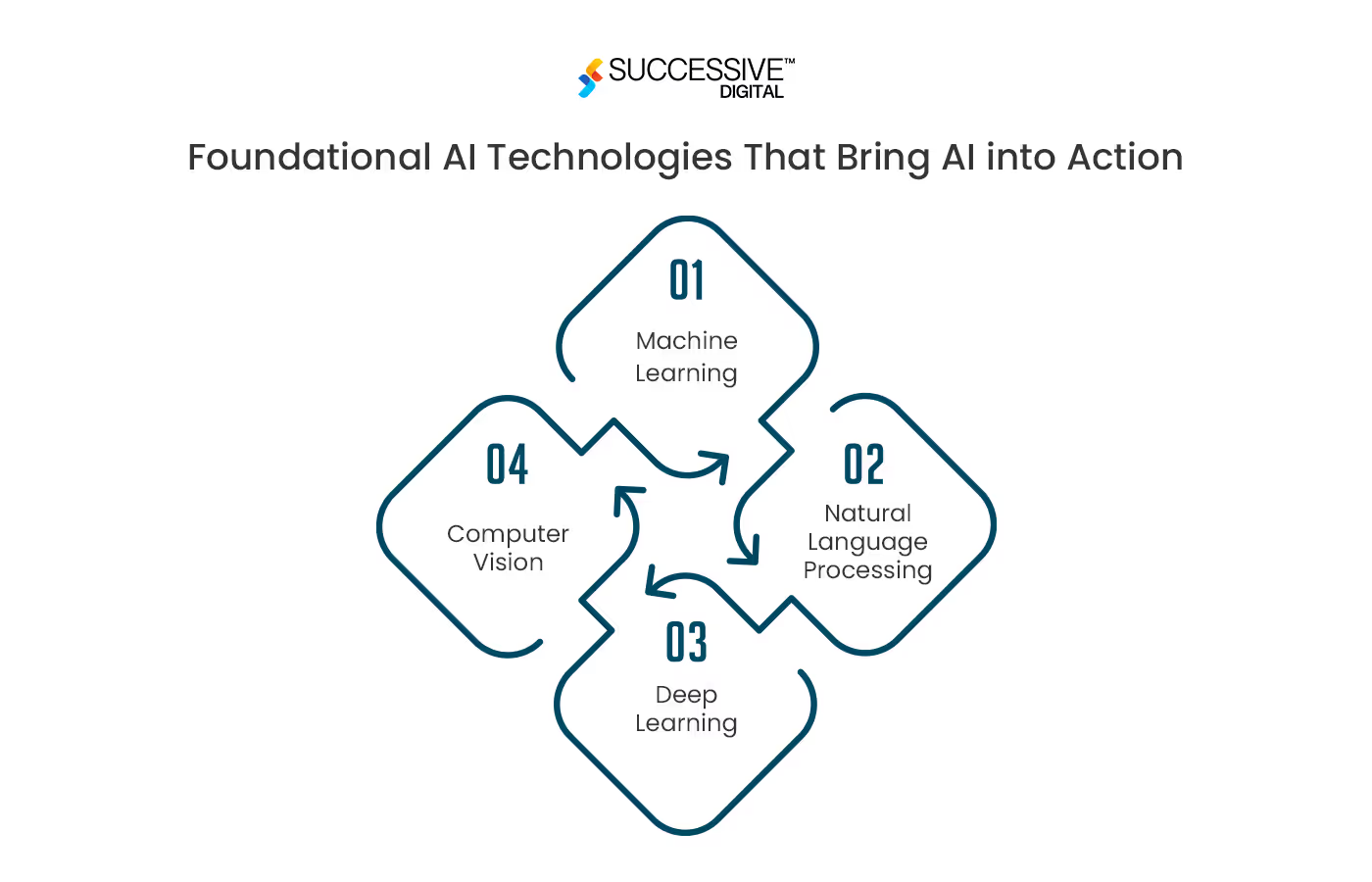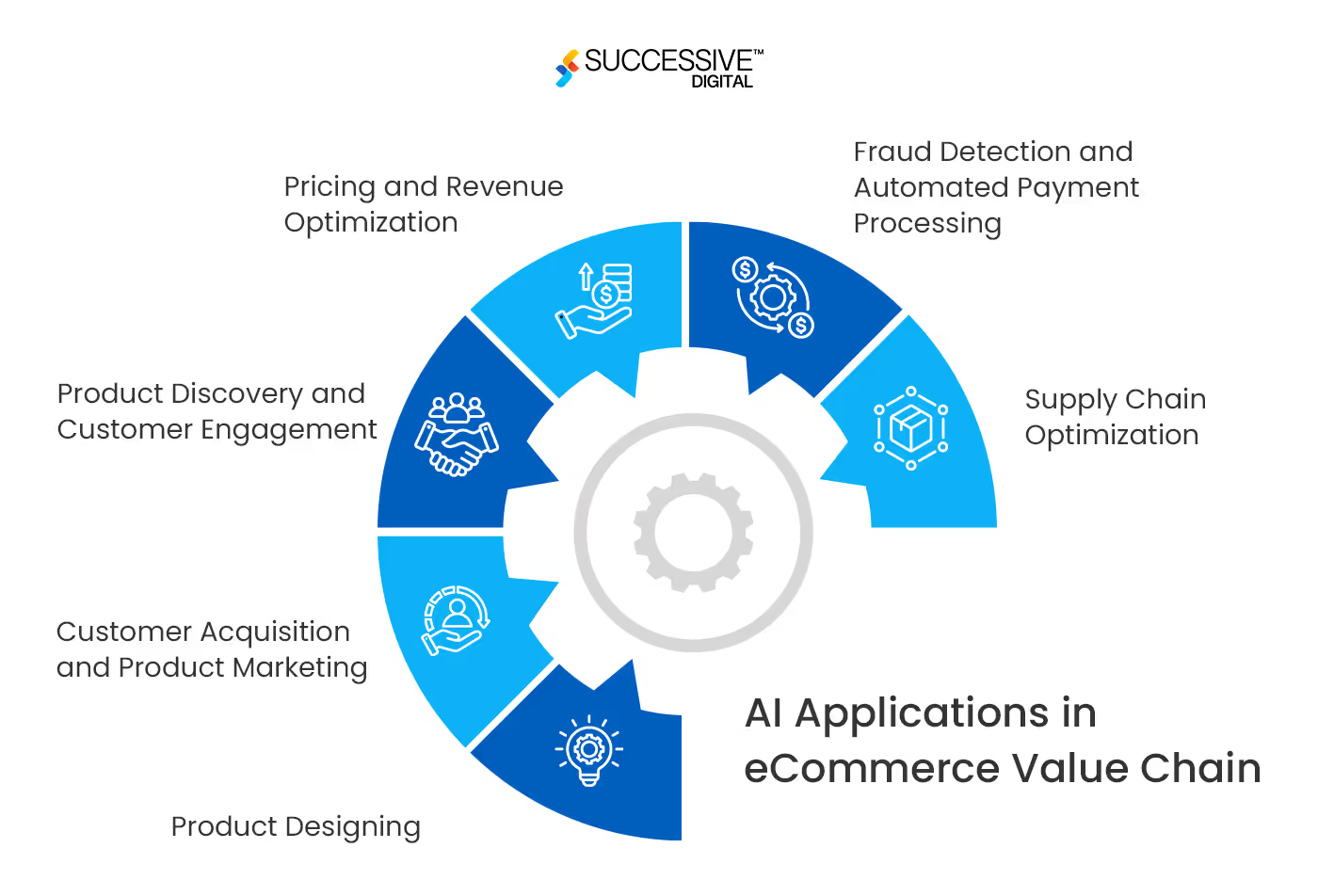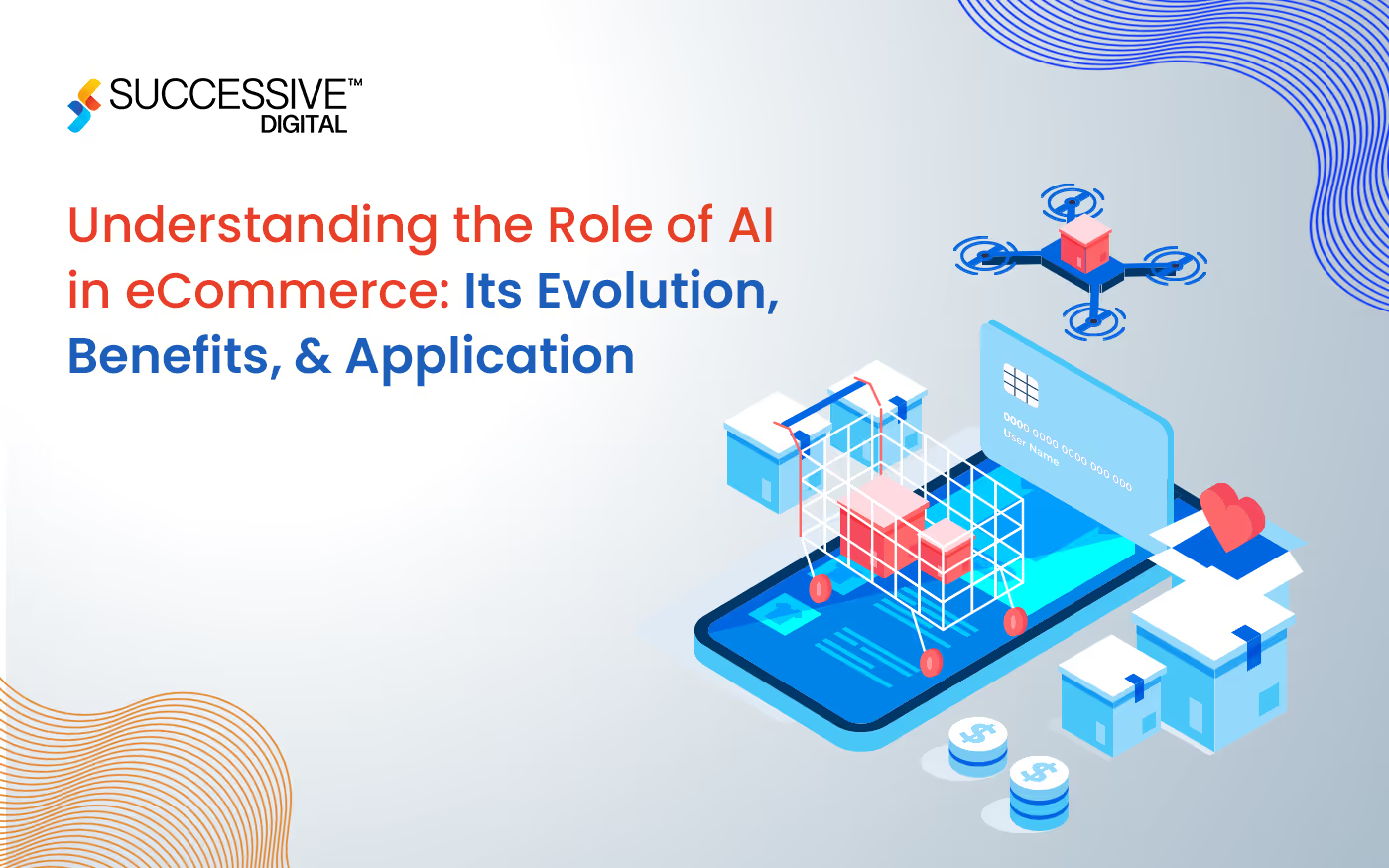Artificial Intelligence (AI), a technology that once remained in sci-fi stories and ideations, is now an integral part of our lives. We now use it to jot down our emails, get real-time weather updates, write social media captions, and even amplify boring videos to make them more appealing. Today, it is exploited to an extent where implementing AI is not just left as an option or a luxury technology for businesses, no matter which industry they thrive in. It has become imperative to use AI across every aspect of their business operations. eCommerce is no exception to embracing artificial intelligence, considering it is one of the major sectors that has seen remarkable growth during and mainly in the post-COVID era.The sector has recognized its potential and utilizes AI capabilities in multiple forms to enhance customer experience, streamline back-office operations, and boost sales. From personalized product recommendations to automated customer service, AI has transformed the ecommerce ecosystem and opened new possibilities for growth. Various eCommerce giants have successfully implemented AI in their business value chain. To explain it with an example, Sephora partnered with Google to allow customers who own Google Home Hub to make beauty-specific voice commands. In response, it plays specific makeup tutorial videos that air on Sephora’s YouTube channel. In another scenario, Walmart leverages AI and ML algorithms to power its inventory management system and automate the entire supply chain lifecycle.This explains the power of artificial intelligence and machine learning. Even this study by Statista shows that the global AI software market will reach 126 billion USD by 2025, depicting the growing opportunities for AI in eCommerce. Let’s now understand the evolution of artificial intelligence in eCommerce, its potential benefits, and, lastly, its application across the eCommerce value chain.
Evolution of AI in Commerce: The Historical Overview
eCommerce has witnessed a remarkable evolution in the last couple of years, and AI has played a major role in pushing the boundaries for both buyers and sellers. AI in eCommerce has not only redefined how a product is discovered and bought. It has also transformed how a product is transitioned from designing to last-mile logistics. The disruption of artificial intelligence in eCommerce was first seen with the world’s first chatbot launch, Eliza, in the year 1966. However, Amazon, being the one who always amazes the world with its USP, launched a collaborative filtering and recommendation functionality in its online store in the year 1998, which was actually AI magic that made online shopping interesting for shoppers. Another major disruption was the birth of virtual assistants that began with the launch of Apple’s Siri in 2011 to Google’s virtual assistant Alexa in 2014 and is continued that pushed commerce to another level and gave customers an option to shop hands-free via voice command, without hustle, and in one-go. Fast-forward to 2024, the adoption of complex AI in eCommerce began when the implementation of Generative AI (an advanced AI model) began in various functions of the eCommerce value chain.Although Gen AI is still under experimentation, eCommerce giants, majorly Amazon, are heavily utilizng it for product recommendations, demand forecasting, as well as customer service to improve their overall business performance.If we talk about current scenarios of Generative intelligence in eCommerce, Google’s Gemini, Meta’s Llama, and OpenAI’s ChatGPT are actively competing to make chat-based commerce or say, conversational commerce a successful online shopping model in the coming years.
Foundational AI Technologies That Bring AI into Action

AI is not a singular technology; it is instead an umbrella term that encompasses four foundational technologies that work interchangeably to fuel artificial intelligence in eCommerce.
- Machine Learning
Machine learning (ML) uses statistical techniques, including algorithms, to enable computers to learn from data and make predictions or decisions without being explicitly programmed. ML models were created in order to enable computers to improve at a particular task without telling them how to become better. In other words, these programs learn by repeating specific actions/patterns and observing the results. ML comprises multiple learning models–supervised learning, unsupervised learning, and reinforced learning, that are independently utilized based on their suitability.Use Case in eCommerce: ML can have multiple use cases in commerce. For instance, ML algorithms can analyze customer behavior, purchase history, and preferences to provide personalized product recommendations. It can also analyze historical sales data to predict future demands and eliminate understocking or overstocking inventory issues. To build a custom recommendation engine or enable supply chain automation, you must hire an experienced AI and ML development company that can provide end-to-end AI and ML model development, training, and deployment.
- Natural Language Processing
Natural language processing (NLP) is the branch technology of AI that focuses on enabling computers to interpret and generate natural human-like language. It deals with interactions between computers and human languages and aims to make software understand the spoken and written word, basically providing a bridge between human communication and digital interfaces. This allows NLP models to further generate meticulous responses to answer a human query in such a way that it eliminates the need for a human agent to answer the query.Use Case in eCommerce: The primary use case of NLP in commerce is for customer service via a chatbot, which provides accurate responses to a user as if they are talking to an actual human agent. If you’re also looking to build a bespoke chatbot fior your online store, hiring a technology partner with AI capabilities can help. They can develop an AI chatbot solution for eCommerce so that you can let the smart ML algorithms handle customer queries in a 24/7 timeframe.
- Deep Learning
Deep learning is a subfield of machine learning inspired by the human brain's structure and function, known as artificial neural networks. A neural network is a machine learning model that mimics the human brain to process data and make decisions. Deep learning uses multi-layered neural networks with many hidden nodes to automatically learn patterns and relationships in data. In deep learning, the key is large sets of data. The algorithm is not only thinking of the path but also trying to identify nodes and define the importance of different elements it finds in its path. Use Case in eCommerce: Deep learning algorithms can analyze product images, which can help businesses enable visual search functionality for the users where they can do image-based searches for more accurate product discovery. These algorithms are also a perfect tool for customer churn prediction as they can analyze customer behavior data and predict which customers are at risk of leaving so that merchants can implement strategies to keep them engaged until and beyond purchases.
- Computer Vision
No matter how developed computers are today, they still need technologies to help them understand and interpret what an image is about. This is where computer vision is required. It’s an AI model that helps the computer to interpret and understand images and videos and then provide an accurate response. Use Case in eCommerce: The perfect use case of computer vision in eCommerce can be AR-based shopping, where customers can preview the product image virtually while sitting at home. Another can be for quality control, where computer vision can detect errors and faulty issues in product images while comparing them to standard images and providing quality issue alerts to the merchants.
Benefits of Artificial Intelligence in eCommerce
Utilizing Artificial Intelligence in eCommerce is a game-changer for businesses looking to enhance their operations, improve customer experience, and increase business ROI. This section will help you understand the benefits of artificial intelligence in eCommerce.
- Personalized Shopping Experiences
AI enables eCommerce platforms to deliver personalized shopping experiences by analyzing customer data and behavior. This is one of the major benefits of AI in eCommerce. Machine learning algorithms can predict customer preferences based on their browsing history, past purchases, and search queries. The AI-powered recommendation engines are integrated within the online store to suggest products to customers that they are more likely to buy, increasing the chances of conversion and boosting sales. For instance, the Amazon Recommendation System utilizes AI and data analytics to gather insights into customer behavior, preferences, and item characteristics to deliver tailored suggestions. Furthermore, you can get assistance from a professional eCommerce development company to integrate the recommendation engine within your online store.
- Enhanced Customer Service
AI-driven chatbots and virtual assistants have revolutionized the way customer service is handled in eCommerce. These bots can provide instant responses to customer inquiries, handle a variety of tasks, and operate 24/7. AI chatbots can instantly answer frequently asked questions, reducing waiting times and improving customer satisfaction.They can also provide support in multiple languages, enabling eCommerce businesses to cater to a global audience without needing a multilingual customer support team.
- Efficient Inventory Management
This modern-age technology allows businesses to optimize and manage their inventory better by analyzing past sales data, market trends, and other factors to conduct predictive analytics and forecast future product demands, helping businesses maintain optimal stock levels. This enables businesses to minimize storage costs and reduce the risk of unsold goods causing unnecessary losses. Additionally, with the help of AI models, businesses can automate the reordering process when stock levels are low, ensuring products are always available for customers. You can also read this blog to understand AI implementation in eCommerce.
- Dynamic Pricing Strategies
With the integration of AI within your system, businesses can implement dynamic pricing strategies by analyzing various factors such as competitor prices, customer demand, market trends, and inventory levels for a specific region and then, based on the customer’s location, adjust the pricing in real-time. In this way, businesses can offer the best price to beat the competition, capitalize on high-demand periods, and clear out inventory during low-demand periods. Remember that offering the right price at the right time can lead to higher customer satisfaction and loyalty.
- Fraud Detection and Prevention
Businesses can enhance security in their eCommerce operations by using AI models to help with fraud detection and prevention. By analyzing patterns and behaviors in real-time, AI systems can identify suspicious transactions or activities and can provide solutions so that they can take preventive measures accordingly. The good thing here is that with AI integration, you can detect fraud as early as possible, reduce chargebacks, and protect the business from potential losses.
- Enhanced Product Search and Discovery
AI-powered search engines and recommendation systems can significantly improve the product search experience for your customers. Natural Language Processing (NLP), machine learning, and deep learning algorithms can understand user intent better and provide more relevant search results. In other words, AI models can understand context and customer intent to provide more accurate and relevant search results and improve their browsing experience and overall satisfaction.Also, read our blog on how AI and ML can transform eCommerce into intelligent solutions.
AI Applications in eCommerce Value Chain

- Product Designing
Although generative AI is still in its experimentation phase, it’s still serving as a potent tool for many sectors, especially eCommerce. This advanced AI model enables industrial designers with more meticulous product research and experiences that were previously unimagined. Gen AI helps them develop initial design concepts significantly faster than traditional methods so that they can roadmap further steps– from product packaging to ultimate retail and online store displays in the most intuitive way possible. In fact, a study by McKinsey estimates that Gen AI will unlock $60 billion in productivity for product R&D alone.
- Customer Acquisition and Product Marketing
Customer acquisition is the most crucial step as this is what can ultimately make or break a deal. Fortunately, AI and machine learning in eCommerce work up their magic where traditional customer acquisition methods failed. These smart algorithms analyze large amounts of data to identify potential customers and tailor marketing efforts more effectively. In other words, it can study customer behavior patterns, specific preferences, and trends to help businesses understand what products or services people are most interested in. Businesses can then utilize AI for intelligent product marketing by automating tasks like creating personalized emails, targeted ads, and even social media interactions; AI ensures that the right message reaches to the right audience at the right time. This not only helps attract new customers but also improves customer engagement by offering more relevant and timely content, making marketing efforts more efficient and cost-effective.
- Product Discovery and Customer Engagement
Another viable use case of AI in eCommerce is product discovery and customer engagement. Again, the foundational AI technologies–ML, deep learning, and computer vision are majorly utilized to enable faster product discovery and search for the customers and longer customer engagements. Deep learning’s CNNs and computer vision algorithms work interchangeably to help with visual search. This allows for image-based product discovering functionality that enhances customer satisfaction by providing relevant product matches. It also provides semantic search capabilities where user intent is given priority over computer logic.ML and deep learning algorithms work hand in hand to help with recommendations. Since Deep learning identifies nodes in data elements, it helps with more accuracy. By analyzing past customer purchasing patterns, browsing patterns, preferences, and market trends to provide the most accurate and hyper-personalized product recommendations for purchase success and cart abandonment reduction.
- Pricing and Revenue Optimization
The use case of artificial intelligence in eCommerce is not limited to operational activities, it’s also critical in decision making, especially product pricing optimization, upon which the revenue of a business stands. ML algorithms analyze large sets of data to identify purchase patterns and trends that human decision-makers might miss. It can take into account factors like past customer behavior, market demand, competitor pricing, customer’s location, and seasonal variations. Using this information, AI model can help with defining most accurate pricing ranges for products, ensuring it balances business’ profitability with competitiveness. This means businesses can adjust prices in real-time, responding quickly to changes in the market. Additionally, AI can forecast future sales, helping businesses make better decisions on inventory and promotions.
- Fraud Detection and Automated Payment Processing
The eCommerce sector utilized fraud detection models that are infused with machine learning and deep learning algorithms to analyze anomaly patterns, fraudulent errors, and identify suspicious activities that might otherwise go unnoticed. When it comes to fraud detection in eCommerce, the AI systems can monitor thousands of transactions in real-time, comparing each one to known behaviors of legitimate users and fraudsters. These systems learn over time, recognizing unusual patterns like sudden changes in location, spending habits, or the use of multiple accounts. When something suspicious is detected, AI models can trigger and flag the transaction for further investigation or even block it automatically, minimizing the risk of financial loss. As far as automation in payment processing is concerned, AI models can significantly enhance payment processing in eCommerce with the infusion of biometric authentication and blockchain technology. AI also optimizes the customer experience by enabling more personalized payment options, such as offering preferred payment methods or recommending financial solutions like installment plans based on a user's purchase history. Additionally, AI-powered systems streamline backend operations, such as automating transaction verification and reconciliation, which reduces manual errors and operational costs. By continuously learning from vast datasets, AI can adapt to evolving consumer behavior and fraud tactics, creating a more secure, efficient, and seamless payment process for both merchants and consumers.You can also read our blog on data security solutions for more secure commerce to learn more about the modern solutions that can help with data security in the commerce ecosystem.
- Supply Chain Optimization
AI-driven supply chain solutions help optimize the supply chain lifecycle of a business by significantly improving inventory management processes. These AI models are smart enough to analyze and predict stock requirements based on past inventory data, ensuring accurate stock levels, and preventing overstocking, understocking, and unexpected stock-outs. The AI-based systems are also helpful for retail stores where computer vision can be utilized in smart shelves for smart product placement and analyzing stockouts for timely restocking.Traditional inventory management, on the other hand, involved multiple complex processes such as order processing, picking, and packing, all of which were manually handled, making them time-consuming and prone to errors. However, AI systems can counter these challenges by quickly analyzing vast datasets, providing real-time insights into supply and demand forecasting, and helping businesses make data-driven decisions. Some AI tools utilized for AI in eCommerce today, are so advanced that they can not only predict past consumer habits but also the newer ones and forecast seasonal demand, enabling companies to anticipate future trends and reduce the costs associated with excess or unwanted inventory.AI can also help with warehouse automation and increase efficiency by automating tasks such as item retrieval and order fulfillment, ensuring reduction in the reliance on manual labor, addressing labor shortages, and seamless order processing from the warehouse to faster deliveries to the customer. Additionally, AI-driven automation cuts down operational costs across the supply chain, reducing human oversight errors and improving long-term productivity. By integrating AI-powered robots in warehouses, businesses can achieve higher levels of speed and precision, ultimately lowering operational expenses. The improved accuracy and efficiency in warehouse tasks also contribute to on-time delivery, as automated systems eliminate bottlenecks and streamline the process, ensuring that orders are fulfilled promptly. Lastly, AI also enables smart logistics processes in collaboration with robotics process automation (RPA). This involves automated delivery vehicles and drones that are functioned with delivery information and real-time route information for faster deliveries, especially in areas where manual delivery agents are unable to reach.
Don’t let outdated eCommerce systems hinder your business growth.
Download our AI in eCommerce whitepaper to understand the capabilities of this technology and how it can help you achieve business excellence.
Click Here to Download
Summing Up
Artificial intelligence has taken a strong suit in every industry, be it healthcare or fintech, has embraced this technology and is continuously benefiting from it, and the retail industry is no exception. With an aim to improve the customer shopping experience and fulfill their growing demands, businesses are constantly upscaling their strategies. Amidst this effort, they are also leveraging the core capabilities of AI. From product search and recommendation to customer support and smart logistics, each eCommerce function is now backed by artificial intelligence. This has brought a significant revolution in how products are brought and sold, not only in the online world but also in the retail environment. And why not? There are various benefits of AI in eCommerce, including improved inventory management, personalized shopping experiences, and so on. Moreover, consider hiring a professional technology partner such as Successive Digital, which provides dedicated AI solutions for eCommerce and can develop bespoke solutions for your specific business use case.For more details and information, get in touch with us today!
.avif)




.webp)





.jpg)









